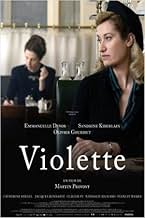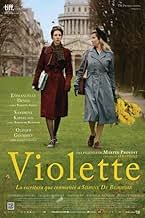Agrega una trama en tu idiomaViolette Leduc, born a bastard at the beginning of last century, meets Simone de Beauvoir in the years after the war in St-Germain-des-Prés. Then begins an intense relationship between the t... Leer todoViolette Leduc, born a bastard at the beginning of last century, meets Simone de Beauvoir in the years after the war in St-Germain-des-Prés. Then begins an intense relationship between the two women that will last throughout their lives, a relationship based on the quest for free... Leer todoViolette Leduc, born a bastard at the beginning of last century, meets Simone de Beauvoir in the years after the war in St-Germain-des-Prés. Then begins an intense relationship between the two women that will last throughout their lives, a relationship based on the quest for freedom through writing for Violette and conviction for Simone to have in their hands the fate... Leer todo
- Dirección
- Guionistas
- Elenco
- Premios
- 1 premio ganado y 1 nominación en total
- Dirección
- Guionistas
- Todo el elenco y el equipo
- Producción, taquilla y más en IMDbPro
Opiniones destacadas
The second thing is that both Kiberlain and Devos are outstanding. Devos takes this role of Violette and makes it completely human. She is a dozen conflicted people and all the time in need of many things but most of all, in need of love. As de Beauvoir, Kiberlain is magisterial. She has de Beauvoir's haughtiness, her brilliance, her perfect sense of her own destiny.
The relationship between the women of such different circumstances is told with grace and balance and insight.
The photography and choice of locales is good too. The sense of place is considered, from the cold farm in winter, through to freezing Paris and then the Midi in summer at the end. Some shots may linger, because it can look so good on the screen, but that remark apart there is little to fault here.
Recommended for all its best virtues.
When the film opens, Violette (played by Emmanuelle Devos) is running from the police. We assume that she's wanted by the Gestapo, but, in fact, she is just caught hiding some black-market food, for which she spends a few days in prison.
Eventually, after the war, LeDuc goes to Paris, where she is befriended by Simone de Beauvoir (played by Sandrine Kiberlain). LeDuc is introduced to de Beauvoir's circle-- Sartre, Camus, Genet. LeDuc began to write--mainly semi-autobiographic novels--that attained some popularity, despite being heavily censored. The censorship was due to the lesbian content, as well as the graphic sexuality. (Tame subjects now, but not in post-war France.)
I didn't enjoy this movie much. Violette, as portrayed in the film, wasn't really a fascinating character. The movie ran for over two hours, with too many scenes of discussions in publishers' offices. I thought the best component of the film was Kiberlain's portrayal of Simone de Beauvoir. Her Beauvoir was beautiful in a non-traditional way, and very forceful and direct. Despite the title of the movie, the screen didn't light up when LeDuc was portrayed. For me, Beauvoir was the character who was truly at the center of the movie.
We saw this film at the Little Theatre, as part of ImageOut, the admirable Rochester LGBT Film Festival. It will work well on DVD.
Violette Leduc was a French novelist who approached female sensual and sexual subjects, including lesbian affairs, with fresh and original directness. This is one story of her life. portrayed as largely tormented and often filled with a sense of hopelessness. Her writing and her love life was constantly ravaged.
But this all happens in beautiful France, so the movie is a gorgeous meandering journey through the 20th Century in pastel, gloomy, golden, timeless countryside. And in the end, for those who care about the real woman, she overcomes. Her death to breast cancer (not in the movie) is just the sad inevitable darkness that seemed to follow her even during the brightness of a great and daring mind.
There is no strong narrative propulsion here, for sure. To like this you'll have to enjoy lingering, and sometime in zones of brown melancholy. I did like that, and liked all of the movie, even if I found myself physically restless, too. I can't see how it could have been done differently, but it's good to have poetic patience (or patience for poetry).
The acting, it must be emphasized, is vivid and raw in a modernist way not far from the many bits of text taken from Leduc's writing. Emmanuelle Davos makes no compromise in her showing both the deeply unhappy and the hopeful sides of this woman. And Sandrine Kaberlain is a severe and knowing Simone de Beauvoir, the famous author who comes again and again to Leduc's aid. The implied love affair, fractured and incomplete, between these two is an important if somewhat thinly sketched part of the larger picture for the title character.
This is all moving, great stuff. There is an echo (or a harbinger) of another pair of women drawn with artistry and love in a recent movie, "Reaching for the Moon" (which I liked a lot). But such a different ambiance here, all dank and fearful with shafts of sunlight only sometimes felt. I recommend them both, but this one will require slowing down and appreciating the mood as much as the details of this intense, ordinary biography.
Emmanuelle Devos impressed me very much with her tenacity in bad times and her masochistic devotion to Beauvoir. Sandrine Kiberlain, reed-thin and erect of bearing, looked and sounded very much like Beauvoir. Olivier Py as the sleazy Sachs stole all his scenes.
¿Sabías que…?
- Bandas sonorasFratres for strings and percussion
Composed by Arvo Pärt
Performed by Tapiola Sinfonietta, Jean-Jacques Kantorow
Selecciones populares
- How long is Violette?Con tecnología de Alexa
Detalles
Taquilla
- Total a nivel mundial
- USD 1,493,822
- Tiempo de ejecución2 horas 19 minutos
- Color
- Mezcla de sonido
Contribuir a esta página






























